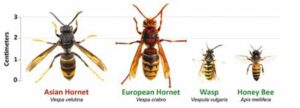Asian hornets, also known as yellow- legged hornets, have been seen in Britain since 2016.
Asian hornets, also known as yellow- legged hornets, have been seen in Britain since 2016. They are an invasive species in Britain as their spread could negatively affect the wildlife already living here, particularly honeybees. The hornets raid honeybee hives by sitting outside them and capturing workers as they go in and out.
The Department for Environment, Food and Rural Affairs (DEFRA) is trying to prevent a nationwide Asian hornet invasion, currently through eradication of individuals and nests. There are concerns that the Asian hornet is becoming established in Britain after they were spotted in two locations at opposite ends of England, in the town of Liskeard in Cornwall and in Hull, within a few days of each other. Asian hornets are relatively new to Britain, only being spotted here for the first time in the small town of Tetbury, in Gloucestershire in 2016. A nest was found and removed by the National Bee Unit. Since then, the insect has been spotted in several counties across the UK, including in Kent, Cornwall, Dorset,
Devon and Hampshire. There have been 45 confirmed sightings in total in the UK since 2016, including 29 nests that have all been destroyed. There has been a sharp increase in sightings in 2023, with at least 22 confirmed reports so far.
How to Identify an Asian Hornet
Asian hornets typically build nests in the open – they often build on tree branches in the foliage. The nest is patterned, which probably helps to disguise it among the leaves. Hornets are grouped within the genus Vespa. They have larger heads in relation to their body size compared to other wasps, and the structure of the head is slightly different. The abdomen has dark patches covering most of the first half and then it gets a bit yellow – it’s quite a distinctive colour pattern.
Asian hornet queens reach up to three centimetres in length and workers around 2.5 centimetres.

When are they active?
Asian hornets are active between April and November, with a peak in August and September and is inactive over the winter.
What to do if you spot an Asian Hornet or Nest?
It is important to report any suspected sightings of this species as soon as possible. Vigilance is particularly required in southern parts of England and Wales and around major ports. Ideally sightings should be reported via the Asian Hornet Watch App or via an Online recording form
Do not under any circumstances disturb or provoke an active hornets’ nest.
For more information please visit: www.nonnativespecies.org



